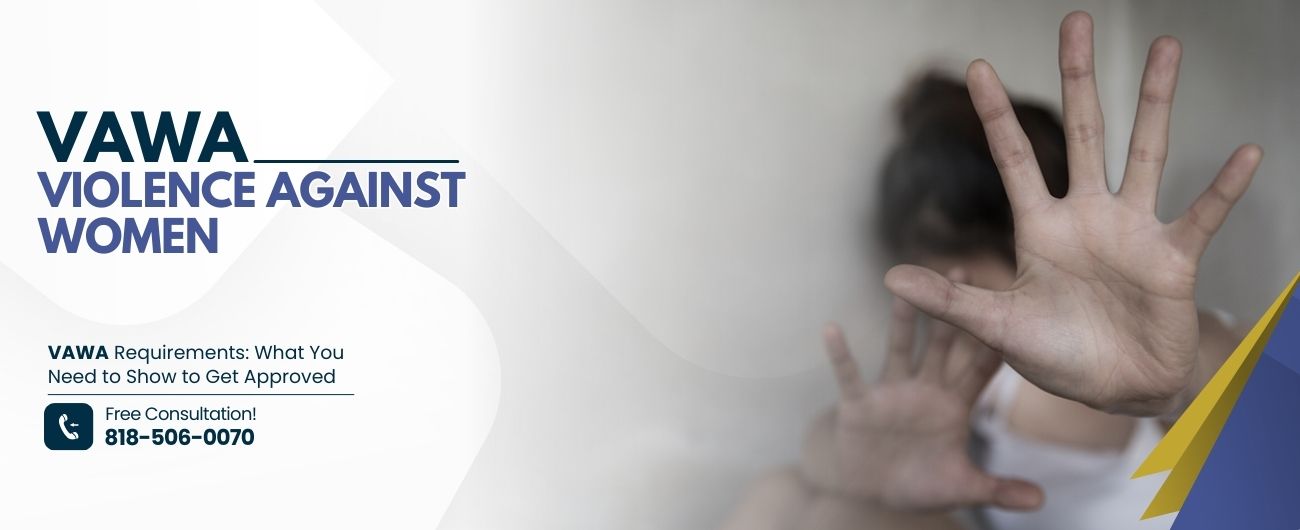
Violence Against Women Act VAWA
What is VAWA?
VAWA, or Violence Against Women Act addresses a flaw in the marriage-based immigration system created by domestic violence and abusive relationships. Sadly, immigrants who are victims of abuse often feel compelled to stay with their abusive U.S. citizen or permanent resident spouses in order to get a green card. The victim needs the abuser’s help to get a green card. This dynamic gives the abusive spouse power to manipulate his or her victim.
The goal of the Violence Against Women Act or VAWA is to fix this problem by allowing immigrants who are being abused to self-petition, independently of their abusive spouse or family member.
Violence Against Women Act preliminary consideration: Be safe!
Before you think about your immigration case under VAWA, you should consider your own personal safety. If you find yourself caught in an abusive relationship, seek out support services for domestic violence. Take advantage of hotlines, shelters, and counseling services. A good starting point might be calling the National Domestic Violence Hotline at 800-799-SAFE.
VAWA Requirements: what you need to prove to win?
The requirements for an immigration case under the Violence Against Women Act vary based on the facts of the case. In certain circumstances, VAWA can apply to parents or children who have been abused or battered by a U.S. citizen or legal permanent resident. VAWA can also be used by abused spouses and children of Cuban Adjustment, HRIFA, and NACARA beneficiaries.
In marriage-based Violence Against Women Act (VAWA) cases, a self-petitioning spouse must show:
- The abusing spouse is (or was) a green card holder or U.S. citizen;
- That the abuser is a permanent resident or U.S. citizen spouse and was legally married to the VAWA applicant;
- That the VAWA applicant lived with the abusing spouse;
- The U.S. citizen or permanent resident spouse abused (i.e., “battered or subjected to extreme cruelty”) the VAWA applicant during the marriage;
- That the marriage was based on a relationship that was entered into for bona fide, good faith reasons and not solely for obtaining immigration benefits; and
- That the Violence Against Women Act applicant is a person of good moral character.
- VAWA Applicants Must prove abuse or battery
To win your VAWA case, you need to show that you were battered or subjected to extreme cruelty by your spouse. USCIS takes into consideration a variety of domestic violence, which is not limited to physical abuse.
Often people mistakenly believe that a successful Violence Against Women Act application must be supported with a police report. But this is not true. U.S. immigration laws provide a flexible legal standard, which allows VAWA self-petitioners to submit “any credible evidence.”
Although not required, it’s helpful to submit any available primary or secondary documentation such as, medical records, police reports, restraining order paperwork, and therapist/counselor reports, domestic violence shelter records.
A good affidavit is essential to a winning VAWA case
A petition under VAWA (the Violence Against Women Act) should be supported with an affidavit or personal statement from the applicant, describing the abuse, the courtship and relationship with the abusive spouse, and the applicant’s good moral character and immigration history. This is a crucial part of the case that should be prepared with meticulous care.
VAWA requires a bona fide marriage relationship
A winning VAWA self-petition requires proof by “clear and convincing evidence” that the underlying relationship was entered into for genuine, good faith reasons and not solely to obtain immigration status. Documentation to show that the parties lived together and shared their lives include, for instance, jointly-filed tax returns, jointly-held leases, insurance, photos, and affidavits from third parties.
How long does it take to get approved for a VAWA immigration case?
USCIS publishes VAWA case processing times on its website. Also, when considering how long it will take to get a green card, factor in the time-consuming process of preparing a compelling VAWA case.
Can Men Apply under the Violence Against Women Act?
Yes. Despite the name, the Violence Against Women Act is not only for women. It also protects men. An abusive same-sex marriage could also serve as the basis for a VAWA case. Precisely the same legal standard would apply regardless of the VAWA applicant’s gender or sexual orientation.
Work Permits under VAWA
To qualify for a work permit or Employment Authorization Document while self-petitioning under the Violence Against Women Act, you’ll need an approved VAWA application (Form I-360) or a pending application for adjustment of status (Form I-485). Usually, you should receive your work permit about 3 months after filing the application (Form I-765).
How will Divorce affect your VAWA case?
A VAWA self-petition must be filed within 2 years of when the divorce becomes final.
VAWA and Remarriage
A VAWA self-petitioner who has been subject to battery or extreme cruelty must wait to get remarried until after USCIS approves the VAWA self-petition (Form I-360). The immigration petition is invalidated if the applicant remarries before USCIS approves the petition.
Call us today to speak with our Immigration or Family Attorneys. THE CONSULTATION IS FREE (818)506-0070